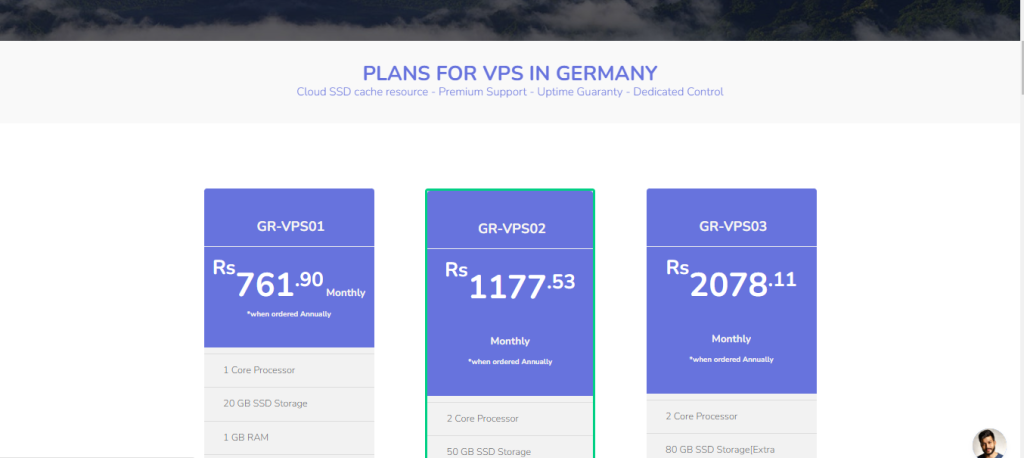The future of VPS hosting in Germany is set to be shaped by several exciting trends and innovations. As we move through 2024, the landscape of Virtual Private Server (VPS) hosting is evolving rapidly, driven by advancements in technology, increasing environmental concerns, and the growing demand for cloud-based solutions. This blog explores the key trends that will influence the future of VPS hosting, providing insights into what businesses and IT professionals can expect in the coming years.
Table of Contents
1. Green Energy Initiatives: A Sustainable Future

One of the most significant trends impacting the future of VPS hosting in Germany is the shift towards green energy initiatives. As concerns about climate change and environmental sustainability grow, data centers are increasingly adopting eco-friendly practices.
a. Renewable Energy Adoption
German VPS hosting providers are at the forefront of incorporating renewable energy sources into their operations. Many data centers are investing in solar, wind, and hydroelectric power to reduce their carbon footprint. This shift not only aligns with Germany’s commitment to renewable energy but also appeals to businesses looking to enhance their sustainability credentials.
b. Energy-Efficient Data Centers
The design of data centers is becoming more energy-efficient, with advancements in cooling technologies and energy management systems. Innovations such as liquid cooling and advanced airflow management are helping to reduce energy consumption and improve the overall efficiency of data centers. You can also opt for free web hosting.
c. Carbon Neutrality Goals
Several VPS hosting providers are setting ambitious carbon neutrality goals. By offsetting carbon emissions and investing in carbon reduction projects, these companies are contributing to a more sustainable future. Businesses that choose these providers can benefit from a greener hosting solution, which is increasingly important to customers and stakeholders.
2. Advancements in Server Technology: Enhanced Performance and Efficiency

The future of VPS hosting is also being shaped by advancements in server technology. As technology continues to evolve, VPS hosting providers are leveraging new innovations to enhance performance and efficiency.
a. Next-Generation Processors
The introduction of next-generation processors, such as those from AMD and Intel, is driving significant improvements in VPS performance. These processors offer higher clock speeds, more cores, and better energy efficiency, resulting in faster and more reliable virtual servers.
b. High-Speed NVMe Storage
NVMe (Non-Volatile Memory Express) storage is becoming more common in VPS hosting solutions. NVMe drives offer significantly faster read and write speeds compared to traditional SSDs, leading to improved performance and reduced latency. This advancement is particularly beneficial for applications that require high-speed data access.
c. Software-Defined Infrastructure
Software-defined infrastructure (SDI) is transforming how data centres manage and provision resources. SDI allows for greater flexibility and automation in resource allocation, making it easier for VPS providers to scale services and optimize performance. This technology also supports more efficient utilization of hardware resources.
3. Growing Demand for Cloud-Based Solutions

The demand for cloud-based solutions is a major trend influencing the future of VPS hosting. As businesses increasingly adopt cloud technologies, VPS hosting providers are evolving to meet these needs.
a. Hybrid Cloud Solutions
Hybrid cloud solutions, which combine on-premises infrastructure with public and private clouds, are gaining popularity. VPS hosting providers are offering hybrid cloud options to provide businesses with greater flexibility and scalability. This approach allows companies to leverage the benefits of both on-premises and cloud environments.
b. Multi-Cloud Strategies
Businesses are adopting multi-cloud strategies to avoid vendor lock-in and enhance their resilience. VPS hosting providers are integrating with multiple cloud platforms to support these strategies, enabling future of VPS hosting to distribute their workloads across different cloud providers for better performance and redundancy.
c. Cloud-Native Applications
The rise of cloud-native applications is driving the need for future of VPS hosting solutions that are optimized for cloud environments. Providers are offering specialized services to support cloud-native technologies such as containerization and microservices, which are becoming increasingly important for modern applications.
4. Enhanced Security Measures: Protecting Data in a Digital Age

As cyber threats continue to evolve, security is a top priority in the future of VPS hosting. Providers are implementing advanced security measures to protect data and ensure the integrity of their services.
a. Advanced Threat Detection
VPS hosting providers are investing in advanced threat detection and prevention technologies. These include machine learning-based systems that can identify and respond to security threats in real-time. Enhanced threat detection helps to protect against malware, ransomware, and other cyberattacks.
b. Zero Trust Architecture
The concept of zero trust architecture is gaining traction in the future of VPS hosting. This approach involves verifying every request and user, regardless of their location or network. By implementing zero trust principles, VPS providers can enhance security and reduce the risk of unauthorized access.
c. Data Encryption
Data encryption is becoming standard practice in VPS hosting. Providers are offering encryption options for data at rest and in transit, ensuring that sensitive information is protected from unauthorized access. Encryption is a critical component of a comprehensive security strategy.
5. Customization and Flexibility: Tailoring Solutions to Business Needs
The future of VPS hosting will see an increased focus on customization and flexibility. As businesses have unique requirements, VPS hosting providers are offering more tailored solutions to meet specific needs.
a. Customizable Plans
VPS hosting providers are allowing businesses to customize their hosting plans according to their requirements. This includes choosing specific amounts of RAM, CPU cores, and storage, as well as selecting additional features such as backups and security options. Customizable plans ensure that businesses can get exactly what they need without paying for unnecessary resources.
b. Scalable Solutions
Scalability is a key feature in the future of VPS hosting. Providers are offering scalable solutions that allow businesses to easily adjust their resources as needed. This flexibility is essential for companies that experience fluctuating workloads or rapid growth.
c. Managed Services
Managed services are becoming increasingly popular in VPS hosting. Providers are offering fully managed solutions that include server management, updates, and support. This allows businesses to focus on their core activities while relying on their hosting provider to handle technical tasks.
6. Improved User Experience: Simplifying Management and Support
The future of VPS hosting will see improvements in user experience, with a focus on simplifying management and support.
a. Intuitive Control Panels
VPS hosting providers are investing in intuitive control panels that make it easier for users to manage their virtual servers. These control panels offer a user-friendly interface with features such as one-click installations, resource monitoring, and automated backups.
b. 24/7 Support
Providing 24/7 support is a priority for future of VPS hosting. Businesses require reliable support to address issues and ensure the smooth operation of their virtual servers. Providers are offering around-the-clock support through various channels, including phone, chat, and email.
c. Self-Service Options
Self-service options are becoming more prevalent in VPS hosting. Providers are offering tools and resources that allow users to perform tasks such as scaling resources, managing backups, and configuring security settings without the need for direct support.
Conclusion
The future of VPS hosting in Germany is characterized by a range of exciting trends and advancements. From green energy initiatives and advancements in server technology to the growing demand for cloud-based solutions, these trends are shaping the VPS hosting landscape and offering new opportunities for businesses.
As the industry continues to evolve, businesses can expect enhanced performance, improved security, and greater flexibility from their VPS hosting providers. By staying informed about these trends, businesses can make strategic decisions and choose VPS hosting solutions that align with their needs and goals.
FAQs
1. What are green energy initiatives in VPS hosting?
Green energy initiatives in VPS hosting involve using renewable energy sources such as solar, wind, and hydroelectric power to reduce the carbon footprint of data centers. This trend reflects a commitment to sustainability and environmental responsibility.
2. How do next-generation processors impact VPS hosting performance?
Next-generation processors, such as those from AMD and Intel, offer higher clock speeds, more cores, and better energy efficiency. These advancements lead to improved performance, faster processing speeds, and increased reliability for VPS hosting solutions.
3. What is software-defined infrastructure (SDI) and how does it benefit VPS hosting?
Software-defined infrastructure (SDI) allows for greater flexibility and automation in managing and provisioning resources. In VPS hosting, SDI enables more efficient resource allocation, scalability, and optimization of hardware resources, leading to better performance and cost-effectiveness.
4. Why is cloud-based VPS hosting gaining popularity?
Cloud-based VPS hosting is gaining popularity due to its flexibility, scalability, and cost-effectiveness. Cloud-based solutions offer businesses the ability to leverage hybrid and multi-cloud strategies, support cloud-native applications, and distribute workloads across multiple cloud platforms for better performance and redundancy.
5. What are some advanced security measures for VPS hosting?
Advanced security measures for future of VPS hosting include threat detection systems, zero trust architecture, and data encryption. These measures help protect against cyber threats, unauthorized access, and ensure the security of data both at rest and in transit.
Bonus Content: In-Depth Exploration of Trends in the Future of VPS Hosting
As we delve deeper into the future of VPS hosting, several emerging trends are poised to make a significant impact on how businesses and individuals interact with virtual private servers. This bonus content provides a comprehensive exploration of these trends, offering insights into how they will shape the VPS hosting landscape in Germany and beyond.
1. Edge Computing and VPS Hosting
Edge computing is gaining traction as a complement to traditional VPS hosting. By processing data closer to the source, edge computing reduces latency and enhances performance. This trend is particularly relevant for applications that require real-time processing, such as IoT devices and smart cities.
A Deeper Dive into the Future of VPS Hosting
As we explore the future of VPS hosting, several trends are emerging that will redefine how businesses and individuals use virtual private servers. This bonus content delves into these trends, providing a thorough analysis of what to expect in the coming years.
1. Integration of Artificial Intelligence and Machine Learning
Artificial Intelligence (AI) and Machine Learning (ML) are becoming integral to the future of VPS hosting. These technologies are transforming how VPS providers manage and optimize their services.
a. Predictive Analytics
AI and ML algorithms can analyze vast amounts of data to predict trends and performance issues. In the context of future of VPS hosting, this means providers can anticipate server loads, detect potential failures before they occur, and optimize resource allocation. Predictive analytics help ensure a smoother and more reliable hosting experience.
b. Automated Management
Automation powered by AI is revolutionizing VPS management. Tasks such as server provisioning, configuration, and maintenance can be handled more efficiently with minimal human intervention. This automation not only reduces the risk of errors but also allows for faster scaling and better management of resources.
c. Enhanced Security
AI-driven security solutions can detect and respond to threats in real-time. By analyzing patterns and behaviors, these solutions can identify unusual activities and potential security breaches more quickly than traditional methods. This proactive approach to security is essential for protecting sensitive data in VPS hosting environments.
2. Increased Adoption of Blockchain Technology
Blockchain technology is making its way into the future of VPS hosting, offering new ways to enhance security and transparency.
a. Decentralized Hosting
Blockchain can facilitate decentralized hosting solutions, where data is distributed across multiple nodes rather than stored in a central location. This approach enhances data security and resilience, reducing the risk of single points of failure and making it harder for malicious actors to compromise the system.
b. Smart Contracts
Smart contracts, which are self-executing contracts with the terms of the agreement directly written into code, are being used to automate and secure transactions in VPS hosting. These contracts can streamline processes such as billing and resource allocation, ensuring that agreements are executed automatically and transparently.
c. Improved Data Integrity
Blockchain technology can provide an immutable record of data transactions, enhancing data integrity. For VPS hosting, this means that any changes to data or configuration settings are recorded in a tamper-proof ledger, ensuring that data remains accurate and trustworthy.
3. Growth of Hyper-Converged Infrastructure (HCI)
Hyper-Converged Infrastructure (HCI) is emerging as a key component in the future of VPS hosting, offering a more integrated and efficient approach to managing IT resources.
a. Unified Management
HCI integrates computing, storage, and networking into a single solution, simplifying management and reducing complexity. For VPS hosting, this means that providers can offer more streamlined and efficient services, with a unified management interface that simplifies resource allocation and monitoring.
b. Scalability
HCI solutions are highly scalable, allowing for easy expansion of resources as needed. This scalability is essential for VPS hosting, where businesses may experience fluctuating workloads or rapid growth. HCI enables providers to quickly and efficiently scale their infrastructure to meet changing demands.
c. Cost Efficiency
By consolidating multiple components into a single solution, HCI can reduce costs associated with managing and maintaining separate hardware and software. This cost efficiency benefits both VPS providers and their customers, making high-performance hosting solutions more affordable.
4. Enhanced Focus on User Privacy and Data Sovereignty
As data privacy regulations become more stringent, the future of VPS hosting will see an increased emphasis on user privacy and data sovereignty.
a. Compliance with Regulations
VPS hosting providers are prioritizing compliance with data protection regulations such as the General Data Protection Regulation (GDPR) and the California Consumer Privacy Act (CCPA). This includes implementing robust data protection measures and ensuring that user data is handled in accordance with legal requirements.
b. Data Sovereignty
Data sovereignty refers to the concept that data is subject to the laws and regulations of the country in which it is stored. As businesses become more aware of the importance of data sovereignty, VPS hosting providers are offering solutions that ensure data is stored and managed in compliance with local laws.
c. Privacy-Enhancing Technologies
Privacy-enhancing technologies, such as advanced encryption and anonymization techniques, are being integrated into VPS hosting solutions.
